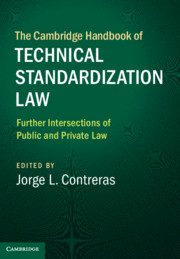 The Cambridge Handbook of Technical Standardization Law
The Cambridge Handbook of Technical Standardization Law from PART IV - Standards and Software
Published online by Cambridge University Press: 04 September 2019
“Open standards” is a fluid term encompassing those standards which are available to be employed to develop multiple implementations compatible with the standard. No single definition can encompass what makes up an open standard, although there are many consistencies between experts, scholars, and lawmakers in their attempts to define the term. The main reasons behind governments adopting open standards are to reduce costs by preventing vendor lock-in and promoting interoperability between different implementations and technologies. However, achieving interoperability between multiple independent implementations that are compliant with a particular standard remains a significant challenge.
To save this book to your Kindle, first ensure [email protected] is added to your Approved Personal Document E-mail List under your Personal Document Settings on the Manage Your Content and Devices page of your Amazon account. Then enter the ‘name’ part of your Kindle email address below. Find out more about saving to your Kindle.
Note you can select to save to either the @free.kindle.com or @kindle.com variations. ‘@free.kindle.com’ emails are free but can only be saved to your device when it is connected to wi-fi. ‘@kindle.com’ emails can be delivered even when you are not connected to wi-fi, but note that service fees apply.
Find out more about the Kindle Personal Document Service.
To save content items to your account, please confirm that you agree to abide by our usage policies. If this is the first time you use this feature, you will be asked to authorise Cambridge Core to connect with your account. Find out more about saving content to Dropbox.
To save content items to your account, please confirm that you agree to abide by our usage policies. If this is the first time you use this feature, you will be asked to authorise Cambridge Core to connect with your account. Find out more about saving content to Google Drive.